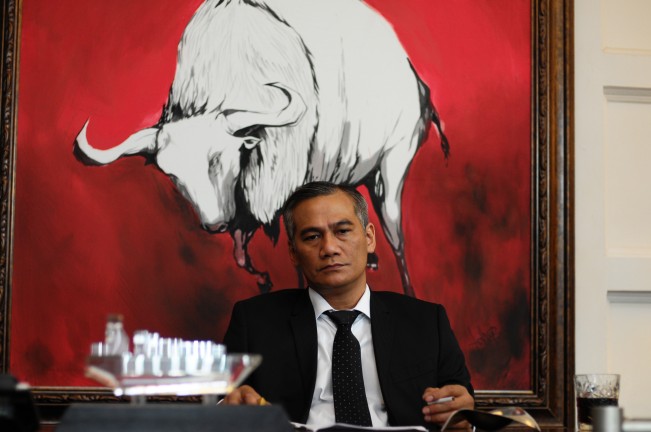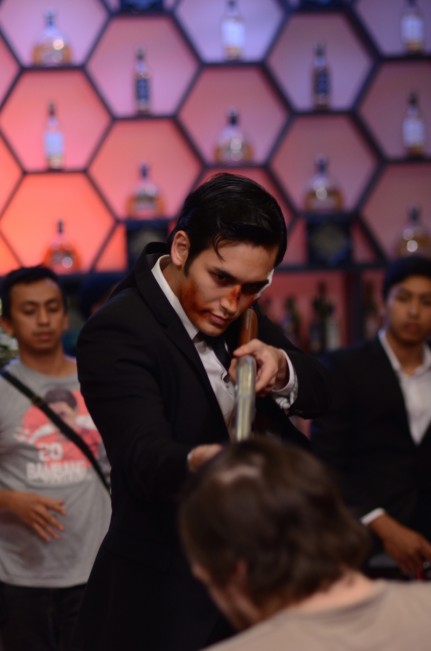By Jake Howell jake.howell@utoronto.ca
The Torontonian Reviews THE RAID 2
The relative failure of the Star Wars prequels is due to the fact that they more or less strayed from what made the original trilogy really cool. A New Hope is that classic Bildungsroman of a young farmboy becoming an unbelievable hero, while The Phantom Menace and the ensuing sequels are really really concerned with trade federations, the Senate, and other galactic politics that make my eyes glaze over pretty much instantly.
This is not to say that the sequel to 2012’s The Raid (originally subtitled Berandal) is comparably bad to any of the Star Wars prequels. It’s not. Rather, it is clear that Gareth Huw Evans, the writer and director of The Raid 2, has committed Taboo: Naboo, and the follow-up to one of the greatest action films in recent memory seriously suffers as a result.
The problem: there’s a lot of plot behind The Raid 2, but not only is it definitively difficult to follow, it is more importantly uninspired and far too drawn out. Where The Raid was relentless, The Raid 2… well, relents, over two-and-a-half hours, to tell a convoluted tale of underworld crime families and corruption. The dialogue here is workhorse at best, as the lines service the most basic of character expositions and motivations. Plenty of talky action films are at least funny or filled with amusing bravado; in the likely event you don’t speak Indonesian, the subtitles are a particularly uninteresting read, and I can recall perhaps only a single juicy quote.
 This expansive story gets lost, both in translation and in location, as the film quickly sprawls all over Jakarta, jumping from set piece to set piece. But this paint-the-town-red approach is yet another unfortunate difference from the single-location devastation of the original: certainly, Evans takes advantage of new environments by incorporating their various elements into the fighting formula, and it’s definitely neat to see the fighters interact with the unpredictability of a public space. That said, I can’t help but think the contained and claustrophobic action of The Raid’s apartment block was a large aspect of its success. Of these set pieces a muddy jailhouse brawl and a highway car chase are two of the film’s major winners, but others are less inventive or visually striking (though the feats of camera trickery in the highway sequence are rather astounding).
This expansive story gets lost, both in translation and in location, as the film quickly sprawls all over Jakarta, jumping from set piece to set piece. But this paint-the-town-red approach is yet another unfortunate difference from the single-location devastation of the original: certainly, Evans takes advantage of new environments by incorporating their various elements into the fighting formula, and it’s definitely neat to see the fighters interact with the unpredictability of a public space. That said, I can’t help but think the contained and claustrophobic action of The Raid’s apartment block was a large aspect of its success. Of these set pieces a muddy jailhouse brawl and a highway car chase are two of the film’s major winners, but others are less inventive or visually striking (though the feats of camera trickery in the highway sequence are rather astounding).
 In terms of the indoors fighting, The Raid 2’s violent vignettes range from repetitive to very exciting. On the tiresome side is the now chock-a-block close-quarters ass-kickery, where Rama (Iko Uwais) takes on a dozen thugs singlehandedly. I don’t want to downplay the impressive choreography of Evans and Uwais when it comes to these sequences, as they are still assuredly entertaining. But 150 minutes sees a lot of similar encounters.
In terms of the indoors fighting, The Raid 2’s violent vignettes range from repetitive to very exciting. On the tiresome side is the now chock-a-block close-quarters ass-kickery, where Rama (Iko Uwais) takes on a dozen thugs singlehandedly. I don’t want to downplay the impressive choreography of Evans and Uwais when it comes to these sequences, as they are still assuredly entertaining. But 150 minutes sees a lot of similar encounters.
On the other hand, the film gets it extraordinarily right with Hammer Girl and Baseball Bat Man, two assassins that stand out a la Gogo Yubari from Kill Bill: Vol. 1. Hammer Girl, with her namesake akimbo weapons, is dressed to kill and delivers absolute destruction in a memorable subway scene. Meanwhile, Baseball Bat Man’s blunt instrument of choice is able to send a homer directly into his target’s skull, dragging his club behind him as he struts. When these killers finally catch up to Rama, the resulting clash is cataclysmic and very thrilling, and it’s a shame there isn’t more of these characters wreaking havoc.
When the longwinded mayhem finally comes to its (somehow) rushed conclusion, the initial issue remains ever-present: Evans spread his ambitious sequel much too thin, and there’s little narrative payoff to the vastness of his story. The waveform of The Raid 2 has nadirs of tedium that simply weren’t present in the original, and even then, some of the apexes feel overwhelmingly long. A one-on-one fight scene late in the film feels endless and becomes exhausting to watch, and it’s disappointing to admit that the same is generally true for the feature itself. If there is a third Raid film to come (and I imagine there probably will be), the scope will have to be reined in considerably for me to get excited for a sit this excessive again; any larger and this franchise will soon lose all semblance to its origin.













